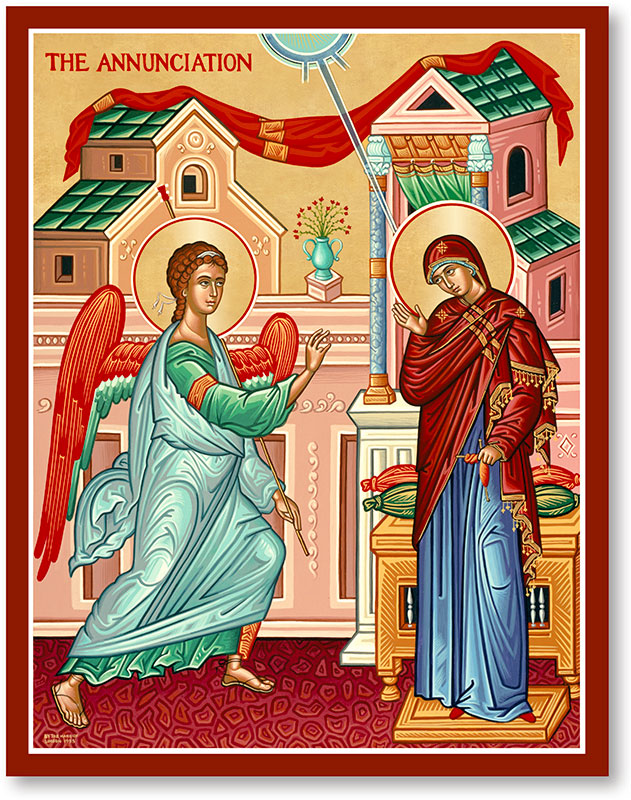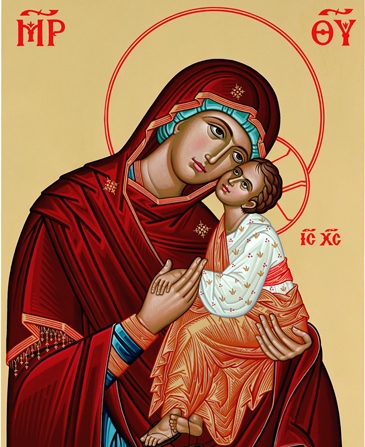Fast of the Dormition of the Theotokos
By Fr. Dr. Daniel Johnson
The dormition or falling asleep of the Virgin Mary is celebrated by the church on August 15th. But the two weeks prior, called the Fast of Dormition, are spent by faithful by remembering and contemplating the life of Mary, the Holy Theotokos. She was the great example for us—the most prominent of all saints who have gone before us. To help us remember her life, in this lesson let us look at the first and last recorded incidents in the sacred scriptures about Mary the Mother of Jesus.
Preparing to Accept Gods Will For Our Lives

The annunciation, as it’s referred to, is the first recorded incident associated with Mother Mary in the sacred scriptures. (St Luke 1: 26-38)
When the angel came and told her that she would become a mother, and that too without marriage, her surprise and shock are only imaginable. But she didn’t run away, cry, or feel discouraged. But she accepted it.
Then Mary said, “Behold the maidservant of the Lord! Let it be to me according to your word.”
Now this is in stark contrast to the unbelief shown by the priest Zacharias—a much older, well respected priest who served God at the temple (St. Luke 1:5-25)
Everyone wants to know God’s will for their life. But what’s more important is that we must be prepared to accept what God says to us!
But the big question is, how do you prepare your heart to receive or accept what God wants to give you?
*The posture of Mary in the icon shows the bowed head and the humble acceptance of God’s will for her life.
Think of our hearts like the soil of a garden. Suppose you want to plant a vegetable garden. What is the first thing you do? You dig up the ground or soil of the garden and clear it! No garden starts off beautiful by itself. You need to spend time removing the stones, weeds, and rocks. You then need to add manure or fertilizer and make sure the soil is prepared enough to accept the seeds you are going to plant. Otherwise, no matter how good the seeds are, they won’t grow well. In other words, it’s all in the soil; the growth of the seeds will depend on how well the soil is prepared. (Ref: Parable of the Sower and Seed in St. Matthew 13:1-23
Our hearts are also like that. It has lots of hard areas—areas where we think we know what is best for our lives; areas where we don’t want to listen and give in. We need help to soften those areas. And some proven practices that the Holy Church, the body of Christ, has provided for us are prayer, fasting, and almsgiving. These spiritual disciplines are meant to soften our hearts and prepare us to receive what God wants us to have in our lives.
By prayer, we mean praying specific prayers, such as the Jesus Prayer, regularly and repeatedly: “Jesus Christ, Son of God, have mercy on me, a sinner.” This prayer reminds us that we are on the path of salvation and need God’s mercy each moment of each day to successfully continue on our journey of sharing in His Divine Nature (2 Peter 1:4).
Fasting: Sometimes we misunderstand it as a means to get what we want from God. But fasting is meant to prepare our hearts to receive what God wants for us! When we fast during specific appointed times on the church calendar (like the Fast of Dormition and Great Lent), we deliberately avoid too much food, eat simply or skip meals, and spend extra time preparing our hearts.
And by almsgiving, we mean looking for opportunities to help those around us, especially the less fortunate, such as the homeless, orphans, and widows. This makes us grateful for what we have, softens our hearts, and makes us more humble.
These practices will help us say, along with Mother Mary, “Behold the maidservant of the Lord! Let it be to me according to your word.”
Preparing to Do What He Tells You to Do!
“Whatever He (Jesus) says to you, do it.” These are the last recorded words of Mother Mary in the Holy Scriptures.
We had earlier seen that it’s important for our hearts to be prepared to receive whatever Jesus wants to give us. And now we see that the restoration of joy and the occurrence of the miracle happened because they were prepared to obey Jesus, even if what He asked didn’t make complete sense to them.
Jesus and his disciples were invited to a marriage at Cana (St. John 2:1-12). However, right in the middle of all the festivities, they ran out of wine. In that culture, wine signified joy and prosperity, and running out of wine was a source of embarrassment for the entire family. The family got so worried that they went and told Mother Mary about the situation, who then told Jesus what happened. Mother Mary then told the family, “I’ve told Jesus about the problem. Now all you need to do is do whatever He says to you.”
Jesus then did the strangest thing—He asked them to fill a huge jar with water and serve it to the guests. Jesus turned water into wine! Yes, Jesus performed a miracle.

* In this icon, the hands of the Mother of God point towards her Son, God incarnate—Jesus; just like her life always pointed towards Christ, in a way telling us, ‘Do whatever He tells you to do!’
Many times in our lives too, Jesus asks us not to do some things that may not make full sense. For example, loving and forgiving those who hurt you or said bad things about you (St. Luke 6:27–36) is exactly opposite of what you wish to do! Avoid gossiping, especially when it involves someone you really don’t like, is very hard (Pro 20:19 & 11:13)! Or avoiding the company of some of your friends who do not love Jesus can make you feel very lonely (I Cor 15:33). But Jesus knows that these things contaminate your mind and will make you sick, just like dirt contaminating your hand can make you sick.
At other times, it’s important to do things even when you don’t fully understand the benefit. For example, the church tells you not to miss Divine Liturgy and participating in eucharist; or forming the habit of praying together as a family daily in front of the prayer altar; or fasting during those appointed times and seasons (like the fast of Dormition or Great Lent). However, the church instructs us to follow these practices because they serve as spiritual nourishment, aiding in the internal battle against illness.
In other words, when we are faced with a choice to obey things that may not completely make logical sense, we should be reminded of Mother Mary’s words: “Whatever He (Jesus) says to you, do it.”
Conclusion:
Mother Mary’s life was by no means an easy one. She went through many hardships, misunderstandings, and financial difficulties and saw her own son brutally killed. And yet through all this, we see a heart prepared to receive whatever God’s will was. Thus she was able to confidently say, ‘Do whatever He asks you to do.’
No wonder she is called Blessed—by the angels, by the saints, and by the church. (St. Luke 1:48)
These two weeks—the fast of Dormition—are a time when we can spend contemplating, thinking, and remembering the life of Mary, the Mother of God. We can think about her words, her life, and her example. May God, in His great mercy, help us to follow the greatest of all saints, the ever-blessed Virgin Mary.
